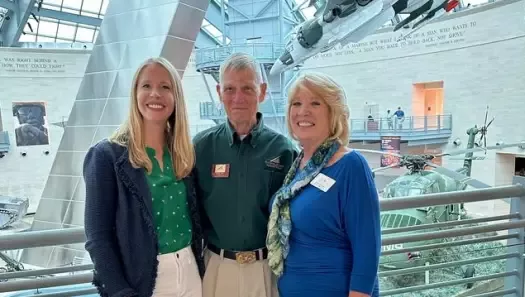Cover Story: “Black Hawk Down” Comes Back into Perspective Over 30 Years Later

Retired Army Maj. Larry Moores addresses the audience at the Silver Star Ceremony.
(U.S. Army photo by Jean Wines)
In the storied annals of military history, there are tales that transcend time, serving as reminders of the indomitable spirit and unwavering courage of those who wear the uniform. One such narrative unfolded in the streets of Mogadishu, Somalia, where Retired U.S. Army Maj. Larry Moores etched his name into the annals of valor, culminating in a long-overdue recognition with the Silver Star Medal.
Maj. Moores received the medal over three decades after the harrowing events of the Battle of Mogadishu, the setting of Mark Bowden’s seminal Black Hawk Down and its film adaptation. As a member of the storied 75th Ranger Regiment and later Joint Special Operations Command, he witnessed firsthand the brutal realities of war, none more intense than the battle that unfolded in the Somali capital.
Maj. Moores' journey through the crucible of conflict spans multiple theaters of operations, from Operation Urgent Fury in Grenada to the cauldron of chaos in Mogadishu's streets. During his acceptance speech at Joint Base Langley-Eustis, Moores offered a glimpse into the ferocity of combat, where 18 Rangers made the ultimate sacrifice, and over 70 more bore the scars of battle. Yet, amidst the overwhelming onslaught of militia forces, the Rangers stood firm, their resolve unbroken, their valor undiminished.
However, Maj. Moores acknowledges that the true magnitude of their sacrifice was not always fully understood by the American public. It took years for the gravity of their actions to be fully recognized, culminating in the recent upgrade of 58 awards to the prestigious Silver Star Medal. For Maj. Moores, it's not about rewriting history but rather offering a more nuanced perspective, a testament to the intensity and magnitude of their bravery.
“We lost 18 in battle and had more than 70 Rangers wounded. That was a tough experience because we were overwhelmed — with the odds against us. But it was amazing to watch the young Rangers still execute under very difficult circumstances,” he said.
The Battle of Mogadishu, immortalized in Black Hawk Down, serves as a poignant reminder of the sacrifices made by those in uniform. It's a bridge that connects generations, inspiring countless individuals to heed the call of duty and serve their country with honor and distinction.
It also marks the perils our military faces even with the most peaceful of intentions. Operation Restore Hope, a U.S. initiative aimed to halt widespread starvation in the region, started in 1992. And, thankfully, the U.N. estimated that no fewer than 250,000 lives were saved.
But Operation Restore Hope would then be remembered by the bloody urban firefight battle that spiraled out of control, resulting in the loss of hundreds of lives, including 18 Americans.
The political situation in Somalia continues to be unstable and unsafe. According to a recent report by Human Rights Watch, “An uptick in fighting in several parts of the country resulted in hundreds of civilian casualties and forced almost 650,000 people to flee.”
And between January and September 2023, 1.5 million people were newly internally displaced, 40 percent of whom were displaced due to conflict, the United Nations reported.
As we reflect on the remarkable journey of Retired Army Maj. Larry Moores, let us heed his call to remember, honor, and embrace the timeless virtues of courage, sacrifice, and selflessness.
And in doing so, we ensure that the legacy of Mogadishu lives on, that the original humanitarian intent of their work there prevails, and stands as a beacon of hope and inspiration for generations to come.



